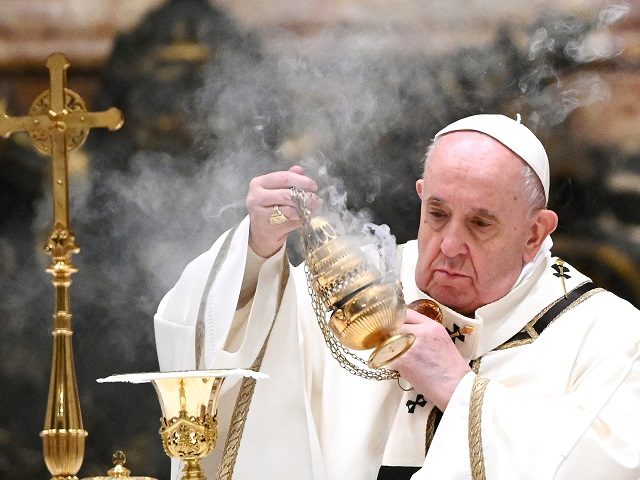ROME — Pope Francis has again snubbed the Uyghur Muslims in his Christmas blessing Friday, calling attention to suffering and injustice around the world while omitting any reference to those suffering under China’s Communist regime.
In his annual verbal global tour of areas plagued by conflicts, violence, and natural disasters, given during his Urbi et Orbi blessing, the pope recalled the people of Syria, Iraq, and Yemen, the Yazidis, Israelis and Palestinians, the Lebanese people, Ukraine, Burkina Faso, Mali and Niger, Ethiopia, Mozambique, South Sudan, Nigeria, and Cameroon, Chile and Venezuela, the Philippines and Vietnam.
In turning to Asia, Francis said, “I cannot forget the Rohingya people: may Jesus, who was born poor among the poor, bring them hope amid their sufferings.”
Noteworthy by its absence was any mention of the atrocity of more than a million Uyghurs held in concentration camps in the autonomous Xinjiang territory of northwest China, where there have been credible reports of genetic testing, organ harvesting, torture, and forced abortions.
The first and only time that the pope has publicly acknowledged the Chinese Communist Party’s (CCP) persecution of the Uyghur Muslims appeared in his 2020 book Let Us Dream: The Path to a Better Future. In it, the pope stated: “I think often of persecuted peoples: the Rohingya, the poor Uyghurs, the Yazidi,” in a striking departure from his unwritten policy of never criticizing China.
The CCP immediately struck back at Pope Francis for his comments, as Chinese Foreign Ministry spokesman Zhao Lijian said the pontiff’s remarks had “no factual basis at all.”
“People of all ethnic groups enjoy the full rights of survival, development, and freedom of religious belief,” Mr. Zhao said at a daily press briefing.
The pope apparently learned his lesson, and in Friday’s Urbi et Orbi blessing, he called attention once again to the Rohingya and the Yazidi, but the Uyghurs have been removed from the list.
Similarly, last December, in his annual Christmas message, the pope offered prayers for troubled regions around the globe, remembering all those who suffer persecution, and yet nowhere in the nearly exhaustive list was any mention of the persecution of religious believers in China or the ongoing Hong Kong pro-democracy protests.
Vatican watchers have attributed the pope’s careful silence on China’s human rights violations to his fervent wish to establish diplomatic relations with the Asian giant and to visit the country someday.
The Vatican signed a secret accord with the CCP in September 2018 regarding the naming of Chinese bishops, a move that elicited an avalanche of criticism at the time and has only been aggravated by ongoing CCP aggressions against Christians after the deal was signed.
The accord was renewed this fall despite appeals from governments and human rights groups that begged the Vatican to reconsider its appeasement policy toward the Chinese.
This past July, Foreign Affairs published a searing article noting how prominent Jews were willing to call out China’s atrocities toward Uyghur Muslims in contrast to the silence of the Catholic Church.
The president of the Board of Deputies of British Jews, Marie van der Zyl, drew comparisons between the plight of the Uyghurs in China today and the Holocaust, Benedict Rogers noted in his article, while the Vatican has refused to use its moral influence to call out the abuses.
Nobody could see the evidence and fail to note “the similarities between what is alleged to be happening in the People’s Republic of China today and what happened in Nazi Germany 75 years ago: People being forcibly loaded on to trains; beards of religious men being trimmed; women being sterilised; and the grim spectre of concentration camps,” Ms. van der Zyl declared.
“But one voice has been strangely absent — that of Pope Francis, ordinarily a powerful advocate for the oppressed,” Rogers wrote. “His silence speaks to the dangers of the deal made with China by the Vatican — and demands that others in the church speak out.”
“It is Francis’s silence that shocks me most,” Rogers wrote. “Almost every Sunday, as he prays the Angelus, he rightly references some injustice somewhere in the world. He has spoken often in the past not only of the persecution of Christians around the world but of the plight of the Rohingyas in Myanmar; the conflicts in Syria, Yemen, Ukraine, and Nigeria; and religious freedom for all.”

COMMENTS
Please let us know if you're having issues with commenting.